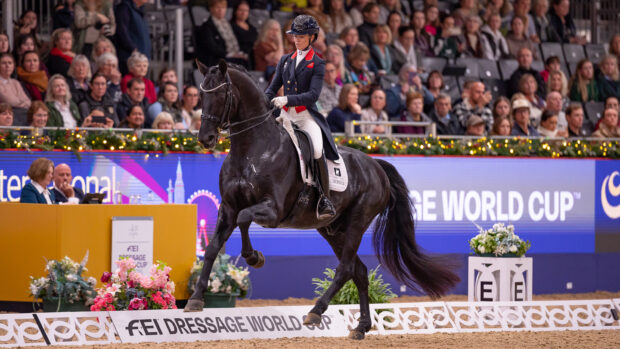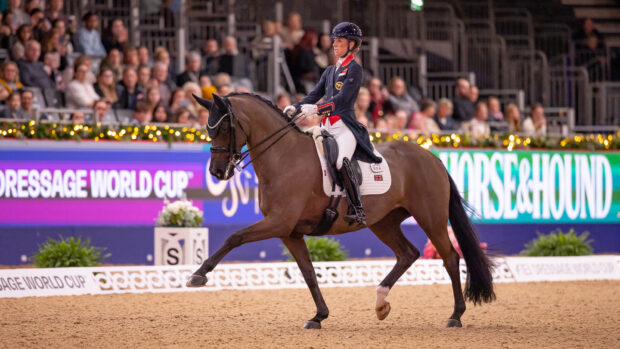The magic of the horse-human relationship comes with the responsibility to give horses a good life – rather than what we might think is a good life.
The theme of the 2024 World Horse Welfare conference yesterday (7 November) was the question “What is a good life for a horse?” Speakers from across the world, and across the industry, covered the many facets of what this can and could mean.
“Why today’s theme?” said World Horse Welfare chief executive Roly Owers in his opening address to the conference.
“This year, the FEI launched its new welfare strategy with a vision of a good life for sport horses, implementing the recommendations of its independent Equine Ethics and Wellbeing Commission. British racing’s welfare strategy, which is going to be reviewed next year, is called ‘A life well lived’. This demonstrates a welcome change that has taken place in sport, particularly how a good life is not just something horses experience on race day or at competition, but as a lifelong experience that must be considered from birth to death.”
Mr Owers said providing a good life for horses is “a worthy aspiration”, but asked whether all agree on what this looks like.
“Does my view of a good life look the same as yours?” he asked. “Would horses take the same view as us? This is a thornier question than it first looks but we’re developing ever greater insight.”
Mr Owers said ensuring horses’ welfare is good is a “journey” humans have been on, a journey influenced by evolving understanding, informed by research.
“Historically, our welfare journey has been too dominated through the health lens and their physical welfare,” he said. “We will all be familiar with welfare policies focused mainly on biosecurity, optimising performance and veterinary oversight. For sure, these have value, but an animal can have good health, but poor welfare.
“For decades, we looked to the five freedoms of animal welfare, a valuable and ground-breaking framework that predominantly made us think about animals’ freedom from negative experiences. But now we recognise that good welfare is just not just based on the absence of negative experiences, but the presence of positive ones too. Today, one of the most widely accepted models for assessing animal welfare is the more holistic five domains – here, health is one of the four functional domains that all influence the fifth, a horse’s mental state, and our goal should be to provide our horses with a positive mental state, because only if a horse feels content in themselves from their own individual perspective can their welfare be good.”
Maximising the positives
Mr Owers pointed out that no person or animal is content all the time; all have some negative experiences, which can have a positive effect even if that is just learning from them. The key to giving horses a good life, he said, is to actively minimise the negatives and maximise opportunity for positives.
“Fundamental to good welfare is the ability for us to allow a horse to be a horse, and we can enable this by providing horses with regular access to the three Fs – friends, freedom and forage,” he said. “But is this really synonymous with how normalised certain attitudes and practices are in the horse world? For example, in our efforts to protect our horses as valuable assets by shielding them from injury, keeping them stabled and feeding them a concentrate diet to maximise performance. But at what cost, as we know now, depriving our horses of the three Fs is depriving them of a good life.
“Our horses evolved living in herds on open grasslands within stable social groups and complex methods of communication, some of which we are only now beginning to understand.”
Mr Owers said although people must be careful not to anthropomorphise, horses need a lot of the same things people do, including mental stimulation and some control over their lives, and share many biological responses to different experiences.
“New discoveries seem to appear every week revealing a horse’s ability to problem-solve, recognise faces and respond to our emotions,” he said. “This is why we feel we can build such close relationships with them. This is the magic of the horse-human relationship, but it comes with a responsibility to listen to what they are telling us and acting on it.
“For instance, we know that as prey animals, horses are experts at masking pain or weakness, and they behave very differently when they are completely alone compared to when they’re being observed. We know that 24 common behaviours demonstrated in clusters of eight or more at a time signal that a ridden horse might be in pain. We have this knowledge today, but do our traditional attitudes lead some of us to dismiss these behaviours as naughtiness or disobedience? We must make it our business to know better and act better if we are to give our horses a good life.”
Mr Owers said we must consider ethics; instead of asking “How do I do this with my horse?”, we should ask “Should I do this?”
“And if the answer is no, we shouldn’t,” he said.
“If we decide we can, how do we know the best way of doing it? This is where the science comes in, providing us with evidence to inform our decisions.”
Mr Owers said that if scientific findings are not clear, more research is needed but in the meantime, we should err on the side of caution.
“What is essential is that these debates are carried out constructively and respectfully,” he said. “We will not always agree on everything, but we will often agree on a lot and sniping at each other achieves nothing. After all, our joint aim is to give horses a good life, so having an open-minded dialogue to achieve this aim seems vital.
“Let’s remember too, that just because someone disagrees with us doesn’t make them the enemy; labelling groups or people as antis is not necessarily helpful. We would do better to listen to what they are saying, and having reflected and considered their views, we still might not agree, but we will be wiser for it. We know also that societies globally are increasingly questioning the use of animals in sport and entertainment; when activities have been banned or shunned by the public, such as circuses with wild animals in the UK, why should we keep horses or ride them for sport or leisure? The answer is because we can, and often do, give them a good life. Whether we keep them for leisure, sport, work or companionship, our horses can have good lives if we work to provide this.”
How to give horses a good life
The question is how to do this, and Mr Owers had three key points.
“Firstly, we need to be curious about how horses experience the world and how we impact their lives by what we do,” he said. “We need to be open-minded enough to consider life from the horse’s perspective. This sometimes means questioning our own way of doing things and heeding objective evidence. It would also mean looking at each horse as an individual, as we must be flexible enough to cater to their specific welfare and mental needs.
“Secondly, we need to take a truly holistic view of equine welfare. This starts with breeding foals only when we have a clear plan for their future, providing all horses with the three Fs to the greatest extent possible, maximising opportunities for positive experiences, training them in ways that are in line with the way they learn and that do not cause them fear, injury or distress, competing or riding them in ways that are ethical, and retiring and rehoming them responsibly and ensuring that they have a good end of life.
“And finally, we need to let go of any stubbornness, regret or shame in our previous methods and recognise welfare is a continuum. Perfection doesn’t exist,but we can seek to constantly strive to do our best in making improvements. We should always be wary of making excellence the enemy of the good. Incremental change really can make a significant difference to the lives of our animals today, so we need to act now, whilst also striving to make longer-term, systemic changes.”
We are all, or should be, continually learning.
“Let’s celebrate the good lives we already provide our horses, but also embrace change and foster an environment of humility and diligence towards doing better,” Mr Owers said. “Let’s also be realistic and recognise that change can be hard. We will make mistakes, that is forgivable, what is not forgivable is not trying or not learning from our mistakes. This is the journey that we have chosen by involving horses in our lives. They give us good lives, so it’s only fair we give the same to them.”
- To stay up to date with all the breaking news throughout major shows such as London International and more, subscribe to the Horse & Hound website
You may also be interested in:

‘A good life for horses’: why equestrian sport’s future rests on all our shoulders, and what are the next steps
Equestrian world commits to maintaining a good life for horses in sport

Olympic rider speaks up on public acceptance: ‘We have to explain we give the horses a good life’

Mutual respect and good equine citizens: giving horses the best start in life

Subscribe to Horse & Hound magazine today – and enjoy unlimited website access all year round




